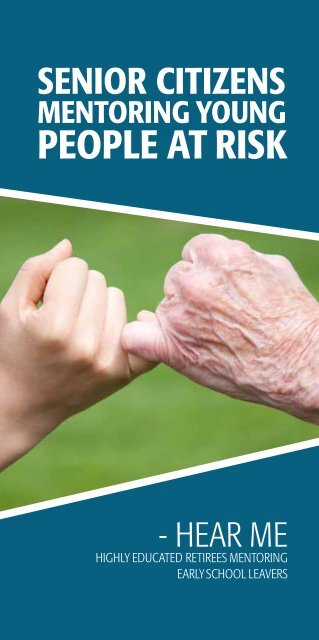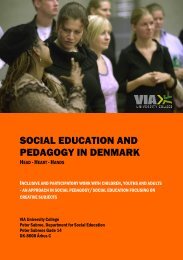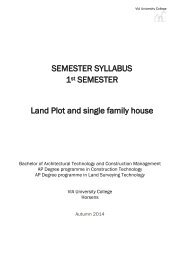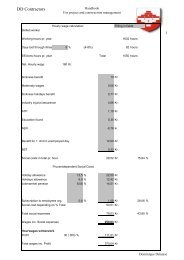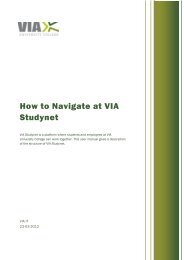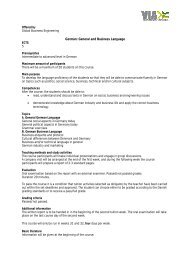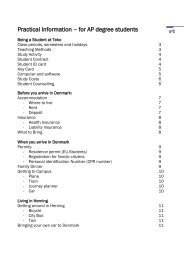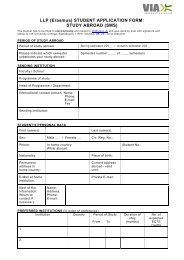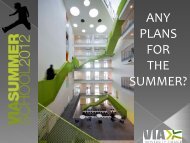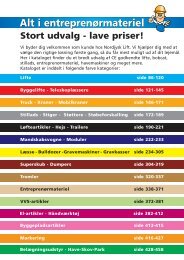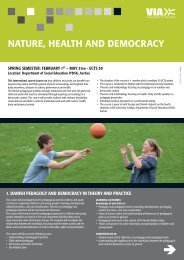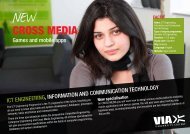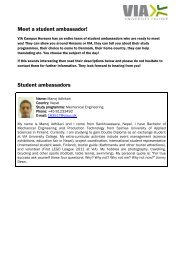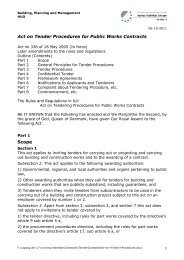Leaflet about the HEAR ME project - VIA University College
Leaflet about the HEAR ME project - VIA University College
Leaflet about the HEAR ME project - VIA University College
Create successful ePaper yourself
Turn your PDF publications into a flip-book with our unique Google optimized e-Paper software.
Senior citizens<br />
mentoring young<br />
people at risk<br />
- hear me<br />
Highly Educated Retirees Mentoring<br />
Early school leavers
The <strong>project</strong> <strong>HEAR</strong> <strong>ME</strong>:<br />
Senior citizens mentoring young people at risk<br />
The ageing population in Europe is drastically growing. Many<br />
senior citizens are resourceful and wish to make a social contribution<br />
to society but do not necessarily have <strong>the</strong> exact competences<br />
needed to do so. One in six young adults in Europe<br />
has not completed upper secondary education and does not<br />
have <strong>the</strong> needed qualifications to obtain a good job. Economic<br />
and social consequences are significant for <strong>the</strong>m and for society.<br />
This is <strong>the</strong> rationale behind <strong>the</strong> <strong>HEAR</strong> <strong>ME</strong> <strong>project</strong>. <strong>HEAR</strong> <strong>ME</strong><br />
wanted to support senior citizens with cognitive and practical<br />
education to become mentors for youth at risk of marginalization<br />
and/or school dropout.<br />
Innovation of welfare<br />
As a consequence of globalization, financial crisis and demographic<br />
developments <strong>the</strong> concept of <strong>the</strong> welfare society is<br />
under great strain. New ways of exploiting human resources<br />
for <strong>the</strong> common good have to be developed, as we are in risk<br />
of marginalization of both senior citizens who can no longer<br />
keep up with e.g. <strong>the</strong> technical developments in society and<br />
of young people who have difficulties gaining foothold at <strong>the</strong><br />
labour market.<br />
Social cohesion is threatened as <strong>the</strong> traditional welfare states<br />
no longer have <strong>the</strong> money to provide universal services of<br />
good quality and <strong>the</strong> process of modernization in traditionally<br />
more family-oriented societies threatens <strong>the</strong> Sou<strong>the</strong>rn European<br />
welfare model. Senior citizens mentoring youth at risk<br />
of marginalization and/or school dropout could be one of <strong>the</strong><br />
innovative undertakings in <strong>the</strong> development of new forms of<br />
solidarity and integration.<br />
Establishing intergenerational mentoring <strong>project</strong>s requires<br />
new partnerships. The success of <strong>the</strong> establishment of new<br />
partnerships that cross borders between state, enterprises,<br />
NGO´s and volunteers depend both on engaged participants,<br />
on a common spirit of pioneering and on agenda and<br />
structures. National, cultural, organizational and local circumstances<br />
are different and require different strategies.
“H has been living at <strong>the</strong> o<strong>the</strong>r side of <strong>the</strong> street for <strong>about</strong><br />
ten years, on <strong>the</strong> borderline between two different areas of<br />
<strong>the</strong> town. It is not because she was not curious, but it was<br />
just too difficult to cross <strong>the</strong> border without a reason. “You<br />
stay at your place, and when you cross <strong>the</strong> street you suddenly<br />
are a stranger. If <strong>the</strong>re is no obvious reason to mix<br />
with <strong>the</strong> world over <strong>the</strong>re it remains a strange world.” This<br />
<strong>project</strong>, <strong>HEAR</strong> <strong>ME</strong>, was a good reason to cross <strong>the</strong> border.”<br />
(Danish mentor).<br />
Intergenerational work<br />
2012 is <strong>the</strong> European year of active ageing and solidarity between<br />
generations. The process of modernization has led to a<br />
greater separation of generations in society. New technological<br />
developments may accelerate this process. Senior citizens<br />
are at risk of exclusion.<br />
However, under <strong>the</strong> right circumstances senior citizens might<br />
develop what <strong>the</strong> well-known developmental psychologist<br />
and psychoanalyst, Erik Erikson called generativity: a concern<br />
for and commitment to <strong>the</strong> next generation, as expressed<br />
through parenting, teaching, mentoring, leadership, and a<br />
host of o<strong>the</strong>r activities that aim to leave a positive legacy of<br />
<strong>the</strong> self for <strong>the</strong> future. Senior citizens might have energy and<br />
capacity to involve <strong>the</strong>mselves in “<strong>the</strong> next generation” and<br />
<strong>the</strong>y might have life experience and networks that make <strong>the</strong>m<br />
suitable for being mentors for young people. In fact, research<br />
tells us that older mentors (compared to same-age mentors)<br />
are more effective.<br />
Mentoring<br />
Mentoring has become very popular in <strong>the</strong> last four decades
in many different settings. “The instinct to help o<strong>the</strong>rs to follow<br />
in one’s footstep, to pass on accumulated wisdom, to<br />
relive one’s career vicariously, is a powerful one” (Klasen &<br />
Clutterbuck). In an atmosphere of respect and active listening,<br />
mentoring is a great good, but used in a selfish way without<br />
<strong>the</strong> commitment to mutual learning, it can be suffocating and<br />
develop dysfunctional dependency.<br />
Some mentors see <strong>the</strong>ir primary role as offering <strong>the</strong> hand of<br />
friendship: <strong>the</strong>y work in <strong>the</strong> affective domain trying to make<br />
mentees feel differently <strong>about</strong> <strong>the</strong>mselves. O<strong>the</strong>rs provide<br />
cognitive resources, offering advice and a guiding hand<br />
though <strong>the</strong> difficult choices confronting <strong>the</strong> mentee. Still<br />
o<strong>the</strong>rs place <strong>the</strong>ir hands on <strong>the</strong> mentees’ shoulders –<br />
encouraging, pushing and coaching <strong>the</strong>ir mentee in <strong>the</strong> process<br />
of gaining skills and qualifications. O<strong>the</strong>r mentors grab<br />
<strong>the</strong> mentees’ hands, introducing <strong>the</strong>m to <strong>the</strong>ir network, using<br />
<strong>the</strong> resources at <strong>the</strong>ir disposal and encouraging <strong>the</strong> mentee to<br />
benefit from <strong>the</strong>ir opportunities.<br />
In our mentoring <strong>project</strong>s many different mentor roles have<br />
developed depending on <strong>the</strong> context of <strong>the</strong> <strong>project</strong>s. In Den-
mark for instance, <strong>the</strong> community centre setting where mentors<br />
and mentees first had to gain mutual respect for each<br />
o<strong>the</strong>r, developed primarily <strong>the</strong> mentor role of a bridge-builder<br />
between <strong>the</strong> life world of <strong>the</strong> young people and o<strong>the</strong>r aspects<br />
of society (school, work, culture).<br />
The mentor course<br />
The mentor course is crucial for <strong>the</strong> success of <strong>the</strong> intergenerational<br />
work.<br />
learning<br />
Early school<br />
leaving<br />
Lifelong learning<br />
Training for intergenerational<br />
mentoring to prevent<br />
early school<br />
leaving<br />
Intergenerational<br />
relationship<br />
senior citizens<br />
youth
The courses were organized in different ways as <strong>the</strong>y had to<br />
fit <strong>the</strong> local contexts.<br />
Despite <strong>the</strong> differences in <strong>the</strong> mentor program in <strong>the</strong> five<br />
countries <strong>the</strong>re are many common elements of <strong>the</strong> courses:<br />
Input/reflection on <strong>the</strong> following <strong>the</strong>mes:<br />
• Mentoring & different mentor-roles<br />
• Voluntary work, social capital and networking<br />
• Young people, (life circumstances, life world, and<br />
psychlogical development)<br />
• Multiculturalism, (religion, gender etc.)<br />
• Ethics<br />
Combined with training of communication skills and<br />
active listening<br />
In all courses <strong>the</strong> didactic has been experience-based and<br />
action learning has been used as a method. Narratives have<br />
played a role in different ways, some partners have used<br />
life stories, o<strong>the</strong>rs have used narratives and storytelling as<br />
approaches to collect and condense important experiences<br />
from <strong>the</strong> mentor’s relationships with <strong>the</strong> mentees. The courses<br />
have been characterized by a play-full approach and dining<br />
and socializing have been important components. At <strong>the</strong> same<br />
time serious coaching and supervising have been used as important<br />
and necessary methods to reflect on experiences.
The senior citizens involved in <strong>the</strong> <strong>project</strong>s in <strong>the</strong> different<br />
countries enjoyed <strong>the</strong> mentor course and <strong>the</strong> mentoring. They<br />
were happy to be able to contribute to <strong>the</strong> young people but<br />
<strong>the</strong>y also really enjoyed <strong>the</strong> social setting with peer-mentors<br />
and trainers/teachers and found this very meaningful.<br />
The mentor course and <strong>the</strong> possibility of sharing and actionlearning<br />
have been crucial for our <strong>project</strong>s. There are many<br />
pitfalls, and it is as important to be careful when matching <strong>the</strong><br />
seniors and <strong>the</strong> youth as to be attentive to signs of malfunctioning<br />
relationships.<br />
We have had many modest but important successes. “We<br />
planned for a September-December mentoring, but three of<br />
our pairs wanted to follow <strong>the</strong>ir relationship on a voluntary<br />
base. Mentors and mentees became friends to each o<strong>the</strong>r.<br />
Nowadays <strong>the</strong>y pay visits to each o<strong>the</strong>r and congratulate on<br />
birthdays. It is a nice success story.” (The Finnish partners).<br />
Perspectives<br />
Intergenerational mentoring is a great vision that requires hard<br />
work to realize. It is hard work to develop sustainable partnerships<br />
that provide a suitable institutional framework. It is hard<br />
work to recruit, to select, to match, in short - to establish <strong>the</strong><br />
mentoring-relationship. However, our experience is that it is<br />
worth it.<br />
In relation to mentoring we reinvented <strong>the</strong> strong combination<br />
of bonding and bridging: two different aspects of<br />
mentoring that have to be balanced. During <strong>the</strong> <strong>project</strong> we<br />
found out that intergenerational mentoring in fact is innovative:<br />
it is not only <strong>about</strong> <strong>the</strong> introduction of a method, it is also<br />
<strong>about</strong> <strong>the</strong> introduction of a new way of organizing a “welfare<br />
service”, an initiative that contributes to social cohesion and<br />
wellbeing in <strong>the</strong> European countries.
This is <strong>the</strong> story <strong>about</strong> a girl, K, from a very<br />
religious Muslim family. Her mo<strong>the</strong>r never left <strong>the</strong><br />
house, and was completely veiled. Also she wore<br />
a veil in which only her face was uncovered, and<br />
she only left <strong>the</strong> house for visiting school. Through<br />
her mentor, she came in contact with things that<br />
she had no knowledge of. She had never been<br />
in contact, besides with <strong>the</strong>ir teachers, with white<br />
Dutch adults. This led to a very special and close<br />
relationship, based on trust. At <strong>the</strong> close of <strong>the</strong> <strong>project</strong>,<br />
<strong>the</strong> girl indicated <strong>the</strong> following: ‘I do not want<br />
to lose my mentor, because she is my window to<br />
<strong>the</strong> world.’ Her mentor, Dorrit, stated at <strong>the</strong> end:<br />
‘She is <strong>the</strong> daughter I have never had.’ They did<br />
not want to end <strong>the</strong>ir contact, and have stayed in<br />
touch after <strong>the</strong> mentoring <strong>project</strong>.<br />
(The Dutch partners).
<strong>HEAR</strong> <strong>ME</strong> is a joint <strong>project</strong> between universities, Universities of<br />
Applied Science and organizations dealing with adult education,<br />
community work and volunteering in five countries: Denmark,<br />
Finland, Ne<strong>the</strong>rlands, Spain and <strong>the</strong> U.K.<br />
Partners and associated partners<br />
Denmark<br />
<strong>VIA</strong> <strong>University</strong> <strong>College</strong>, lead partner<br />
Østbasen, Horsens (community centre)<br />
Turku, Finland:<br />
Turku <strong>University</strong> of Applied Science<br />
Turun Kaupunkilähetys (Turku City Mission)<br />
Turku Vocational Institute (Vocational secondary school)<br />
The Ne<strong>the</strong>rlands:<br />
Utrecht <strong>University</strong> of Applied Science<br />
School’s Cool, Utrecht<br />
HOVO (Adult education provider), Amersfoort<br />
Vader Rijn <strong>College</strong> (preparatory vocational sec. edc. ), Utrecht<br />
Spain:<br />
<strong>University</strong> of Valencia<br />
Town Council of Gandia<br />
The Valencian council of Social Educators<br />
The Valencian council of Social Workers<br />
The U.K.:<br />
<strong>University</strong> of East London<br />
Bonny Downs Community Association, London<br />
Please have a look at our web site:<br />
www.viauc.com/hearme where you will find:<br />
• A Guide for developing senior mentor courses in <strong>the</strong><br />
context of youth mentoring <strong>project</strong>s<br />
• Relevant knowledge and tools as annexes to this Guide<br />
• Mentor Course Packages with <strong>the</strong> concrete <strong>project</strong>s and<br />
courses as carried out in <strong>the</strong> five countries
The <strong>project</strong> <strong>HEAR</strong> <strong>ME</strong> has been carried out in Denmark,<br />
Finland, Spain, The Ne<strong>the</strong>rlands and <strong>the</strong> United Kingdom.<br />
Our most important message is: “Do it! Try it! It works”.<br />
For us it was worth it. It is nei<strong>the</strong>r <strong>the</strong> golden key that opens<br />
<strong>the</strong> jewellery coffer, nor <strong>the</strong> Final Solution, but it is a modest<br />
yet promising contribution to <strong>the</strong> enhancement of well-being<br />
and social cohesion in our societies.<br />
This <strong>project</strong> has been funded with support from <strong>the</strong> European<br />
Commission. This publication reflects <strong>the</strong> views only of <strong>the</strong> author,<br />
and <strong>the</strong> Commission cannot be held responsible for any<br />
use which may be made of <strong>the</strong> information contained <strong>the</strong>rein.


